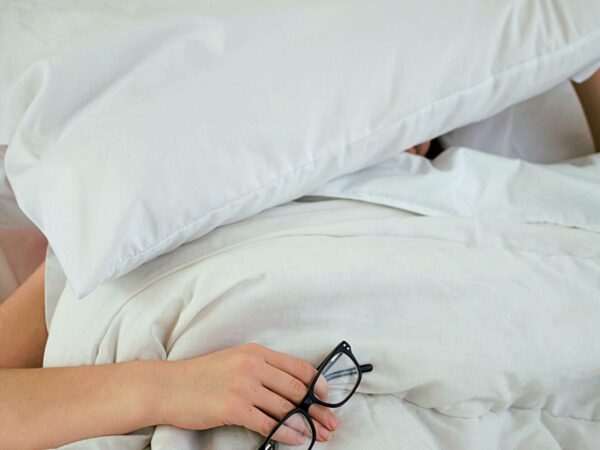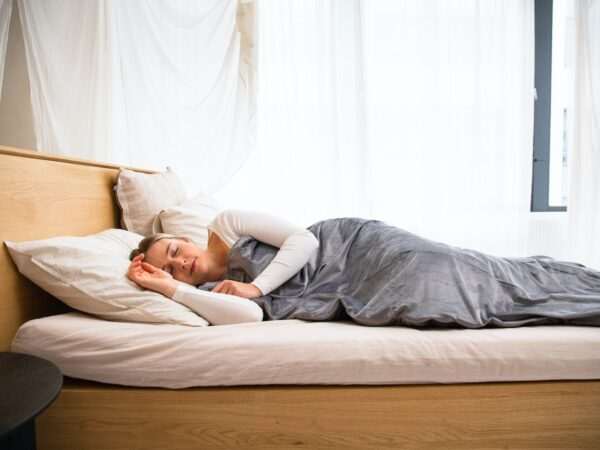Summary. Maintaining healthy sleeping habits is essential for everyone. According to research, sleep is a natural way to repair and recharge your body. A few simple changes in your lifestyle can help you achieve better quality sleep and reach optimal levels of health and wellbeing. The key is to develop a consistent bedtime routine, set realistic sleep goals, take advantage of natural light, and practice mindful breathing. Practicing these habits can help you get the restful and soothing sleep that you need.
Are you feeling exhausted and unmotivated even after getting a decent amount of sleep? Do you want to learn how to take control of your sleeping habits? Having good sleeping habits is essential for health and productivity. In this blog, we will look into some tips to improve your sleeping habits. If you struggle to get enough sleep, you may feel tempted to sleep in late on the weekends. Though it may seem like a good idea, it can dramatically reduce the quality of our sleep and throw off our sleep schedule. Instead, try to stick to your regular sleep wake up times, allowing your body to develop a healthy and regular sleeping pattern.
This includes having sufficient darkness, setting the temperature to what feels comfortable to you, and keeping your bedroom free of distractions and noise. Having a bedtime routine is another key aspect of improving your sleeping habits. Going through the same activities before bed each night, like taking a hot bath or reading a book, will help to relax your body and mind and promote a good night’s sleep. Getting regular exercise can help to improve your sleeping habits. Exercise, when done on a regular basis, can help to reduce stress which is often a root cause of sleep problems. Exercise can also help to tire out your body and make it easier to fall asleep.
How Sleep Quality Impacts Your Health & Well-Being

Studies suggest that better sleep quality can improve physical and emotional health, as well as mental wellbeing and cognitive performance. Poor sleep can lead to irritability, fatigue, difficulty concentrating, a weakened immune system, and a lack of motivation. With this in mind, it’s important to know how to improve your sleeping habits. Before you can improve your sleeping habits, you need to identify why you’re not getting good sleep. If you’re having trouble sleeping at night, you may be staying too late or not getting enough sleep during the day. It’s important to create a regular sleep and wake up schedule, even if it’s just for weekends. This will help your body adjust to the same hours every day. Another way you can improve your sleeping habits is to reduce the amount of stress in your life.
It’s important to create a safe and relaxing environment before you try to sleep. You can do this by avoiding stimulating activities, such as watching TV or browsing the internet, before bedtime. It’s also important to practice relaxation techniques, such as yoga or meditation, during the day. This can help reduce the stress that can interfere with your sleep. You should also avoid drinking caffeine before bedtime, as this can make it harder to get to sleep. Eating large meals close to bedtime can also interfere with your sleep cycle, so it’s best to eat dinner several hours before you plan to go to bed. If you’re drinking alcohol, it’s important to limit how much you drink, as alcohol can disturb your natural sleep cycle. Creating a comfortable sleep environment can also help you get better sleep.
Creating a designated sleep space can also help you relax before bedtime. Consider using blackout curtains and an eye mask, if necessary. Finally, it’s important to practice good sleep hygiene. This means avoiding screens before bedtime; screens emit a blue light that can interfere with your circadian rhythm. You should also avoid consuming large amounts of sugar or carbohydrates before bedtime, as this can make it harder for you to fall asleep. Getting better sleep is an important part of living a healthier and more balanced life.
Identifying Your Specific Sleep Issues
Keep a daily log of these patterns for two weeks and bring this record to your doctor so that they can assess the information. The next step is to evaluate your overall habits and lifestyle that can contribute to poor sleep quality. Make an honest assessment of your caffeine intake, or if you have a habit of using electronic devices close to bedtime.
Evaluate any unhealthy eating habits, too. While not always the primary cause of sleeping issues, your current habits—or lack thereof—may be a contributing factor. Identifying your specific sleep issues can also include assessing mental and emotional health. Stress, anxiety, or depression are significant factors, as is grief or traumatic memories. Talk to your doctor about these concerns and any potential therapeutic help.
Creating Your Own Personalized Bedtime Routine
This is essential for ensuring that you wake up feeling refreshed and energized. A personalized routine will help you to wind down and relax in the evening, allowing your body and mind to recuperate. To kick off your routine, it is important to start off by avoiding screens at least an hour before bed. This includes any type of electronic device, from your phone to your laptop. The bright screens emit blue light which can interfere with your sleep cycle. Rather than turning on the TV, opt for reading or doing a relaxing activity such as yoga or meditation. Scheduling activities such as these can help to transition your mind and body from the energy of the day, into a calm state which will set you up for a good night’s sleep.
This includes warm sheets, blankets and any other items that will help you to slip into a relaxed state. Lighting can also play a part in this. Try to keep your lighting soft and dim, particularly from an hour before bed. If it’s bright outside, using blackout curtains and shades can help to darken the room and encourage you to sleep. Try to create a calming scent in your room. This could be lavender oil, a scented candle or an aromatherapy diffuser. This type of scent helps to relax and unwind you, enabling a better night’s sleep. You have to make sure the room is cool enough to ensure it can be comfortable enough for you to fall asleep faster.
Natural Strategies To Improve Your Sleep Quality

If you are feeling sleepy when you should be alert, or you are not getting enough sleep, your sleep quality could be a major issue. While sleeping medications and other medications may provide short-term relief, increasingly people are turning to natural strategies for improving their sleep quality and general mental health. Here are some tips on how to improve your sleeping habits and boost your sleep quality in the long run. One of the most important things to do is to set up a consistent sleep schedule. Going to bed and waking up at the same times every day will help your body and mind work in sync.
Try to eliminate any digital distractions right before bed so that your body can transition into sleep more easily. Another tip is to get exercise regularly. Regular exercise will not only help you stay physicaly fit but it can also help calm your mind and make it easier for your body to fall asleep. Exercise can also provide you with a natural energy boost in the morning so that you can avoid feeling sluggish during the day. Finally, try to avoid certain foods and drinks.
Try to focus on eating healthy, nourishing meals that are packed with nutrients. Eating well can help you stay energetic during the day and encourages your body to get better rest at night.
Techniques To Relax Your Mind Before Bed

If your mind is calm, so is your body, and this is the best way to ensure a restful night’s sleep. There are many different techniques that can be used to relax your mind before bed. One of the most popular and most effective ways to do this is by meditating. Meditation helps to quiet the mind and bring about feelings of calm and relaxation.
There are also many guided meditations that you can use to help you relax. Another way to relax your mind before bed is through journaling. Write down your thoughts and feelings before bedtime. It doesn’t need to be a long-winded journal entry. Just a few sentences about how you are feeling and what you are grateful for is enough to help clear your mind and relax your body.
Setting Up A Comfortable and Noiseless Sleep Environment

Here are some tips to help you set up the perfect sleep environment, ensuring a restful, restorative night’s sleep. When setting up the ideal sleep environment, lighting plays a key role in creating a relaxing space. You want your surroundings to be cozy but not too bright. Finding the perfect balance can be tricky, especially if you are living in a well-lit apartment building or a noisy city. Dimmed LED lights or smart lights can help make the room more comfortable and inviting.
Heavy curtains are a great way to keep light from entering the room, so that you can wake feeling more refreshed. Noise is as equally important in creating the perfect sleep environment. Whether you live in a noisy city or in a neighborhood with more foot traffic, taking noise-canceling measures can help you get a good night’s sleep.
An ideal noise-canceling environment is achieved by double-glazed windows, thick curtains, earplugs, a good mattress and an acoustic mattress pad. You can also use a sound machine to block out the external noise and create a calming environment. Creating a comfortable sleep environment also involves choosing the right mattress. The perfect mattress should not only be comfortable to sleep on but also have the correct support for your body.
It is also important to determine whether you prefer a soft, medium or hard mattress when deciding which mattress to purchase. Finally, temperature is key for getting a restorative sleep. Every individual has a different level of thermal comfort. The optimal temperature for sleeping usually ranges between 60-67 degrees Fahrenheit.
If you have difficulty hitting this range, you can try investing in a temperature regulation mattress or a mattress pad to ensure that your sleep environment is comfortable and restful. These tips can help you create the perfect sleep environment for a good night’s sleep. Simple measures like adjusting the lighting, noise-canceling and temperature can help you sleep soundly and wake up feeling more refreshed and energised.
Regulate Your Caffeine and Alcohol Usage

Good sleeping habits are essential for a healthy lifestyle, and when it comes to developing and sustaining good sleeping habits, the consumption of caffeine and alcohol is a crucial factor to consider. While caffeine can provide a much needed energy boost to help you get through a demanding day, it can also cause sleepless nights if consumed too late in the day. Similarly, alcohol – while often associated with improved relaxation and improved sleep quality – can cause sleep disturbances and night-time awakenings when consumed too close to bedtime. The best way to regulate caffeine and alcohol intake in order to improve your sleeping habits is to plan ahead each day and decide when, and how much, of each you plan to consume.
Caffeine should be avoided in the evening and cut off several hours before bedtime. Typical caffeinated drinks, such as coffee, tea and energy drinks, should be consumed earlier in the day in order to avoid any negative impacts on your sleeping patterns. Similarly, consumption of alcohol should be limited and regulated to ensure that you’re getting the quality restful sleep you need and to minimise the potential for night-time awakenings. It’s important to plan ahead and think about when in the evening you’ll have your last alcoholic drink as this can make a big difference in terms of how you sleep.
Conclusion
How to improve your sleeping habits? Everyone can benefit from a good night’s sleep, as it helps to restore both physical and mental health. Improving your sleeping habits doesn’t have to be complicated, but it does require some effort and dedication. To get started on your journey toward better sleep, consider making a few simple changes. Start by ensuring that your bedroom is conducive to sleep by keeping it dark, quiet, and at a comfortable temperature.
Develop a relaxing bedtime routine which might involve activities such as stretching, meditation, drinking a cup of herbal tea, and writing in a journal. If you’re having trouble falling asleep, don’t just lie in bed and stare at the ceiling. It’s more beneficial to get up, move around, or engage in a calming activity such as reading. If necessary, you can also discuss the situation with your doctor and consider taking supplements or medications that may help.
Practicing good sleep hygiene might require some effort, but in the long run, it’s worth the time and energy because of its numerous benefits. Do you have any tips on how to achieve more restful sleep? Do you think that medications or supplements can help with sleep troubles? What do you do to create the ideal sleeping environment? Share your thoughts in the comments below.
FAQs: The Insider View
What are the different sleeping patterns?
- Monophasic sleeping: sleeping for one extended period of time (7+ hours per night).
- Biphasic sleeping: splitting your sleep into two distinct time periods.
- Polyphasic sleeping: sleeping multiple times per day, usually in amounts of 2 – 4 blocks per day (total sleep time of 2-6 hours).
- Polyphasic+ sleeping: sleeping multiple times per day with a mix of napping and longer sleep times for a total of 6-8 hours of sleep per day.
- UltraShort sleeping: sleeping once per day for extremely short blocks of time, usually 6 minutes or less per block.
- Segmented sleeping: shifting your sleeping schedule into two or more blocks, often keeping the same total sleep time.
- Uberman sleeping: sleeping for six 20-minute naps every four hours for a total of two hours of sleep per day.
What sleep pattern is healthiest?
Developing and maintaining a consistent sleep routine is essential for regulating your body clock, feeling well-rested, and getting enough quality deep sleep.
What is the 10 sleep rule?
The goal of the 10 sleep rule is to help people get the restorative sleep they need to stay alert and productive during the day.
What is the 10 3 1 rule for sleep?
It involves: 1. Going to bed and waking up at the same time every day (10-hours). 2. Having a strict 3-hour window for all meals. 3. Having only one hour of screen time before bed.
Used Reference Links:
https://sleepeducation.org/healthy-sleep/healthy-sleep-habits/
https://www.nhlbi.nih.gov/health/sleep-deprivation/healthy-sleep-habits















